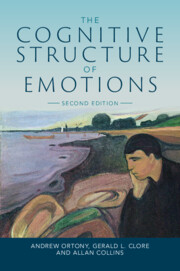Book contents
- The Cognitive Structure of Emotions
- The Cognitive Structure of Emotions
- Copyright page
- Dedication
- Contents
- Figures
- Tables
- Preface to the Second Edition
- Preface to the First Edition
- Chapter 1 Introduction
- Chapter 2 Overview of the Theory
- Chapter 3 Appraisal, the Value System, and Primary Sources of Intensity
- Chapter 4 Factors Affecting the Intensity of Emotions
- Chapter 5 Reactions to Events: I
- Chapter 6 Reactions to Events: II
- Chapter 7 Reactions to the Actions of Agents
- Chapter 8 Reactions to Objects
- Chapter 9 Formalization of the Theory and Additional Issues
- Chapter 10 There and Back Again: OCC and Affective Computing
- Appendix
- References
- Author Index
- Subject Index
Chapter 1 - Introduction
Published online by Cambridge University Press: 04 August 2022
- The Cognitive Structure of Emotions
- The Cognitive Structure of Emotions
- Copyright page
- Dedication
- Contents
- Figures
- Tables
- Preface to the Second Edition
- Preface to the First Edition
- Chapter 1 Introduction
- Chapter 2 Overview of the Theory
- Chapter 3 Appraisal, the Value System, and Primary Sources of Intensity
- Chapter 4 Factors Affecting the Intensity of Emotions
- Chapter 5 Reactions to Events: I
- Chapter 6 Reactions to Events: II
- Chapter 7 Reactions to the Actions of Agents
- Chapter 8 Reactions to Objects
- Chapter 9 Formalization of the Theory and Additional Issues
- Chapter 10 There and Back Again: OCC and Affective Computing
- Appendix
- References
- Author Index
- Subject Index
Summary
The goal of the theory is characterized as presenting, in computationally tractable terms, a comprehensive account of the cognitive underpinnings of the human emotion system and of the cognitions in terms of which different emotion types can be distinguished. The theory proposes three broad groups of emotions, determined by the three major perspectives people can take on what’s going on around them. These three foci are seen as giving rise to reactions to events (things that happen), reactions to the actions of agents (things that agents do), and reactions to objects (things in general). A minimal definition of emotion is proposed, and the different kinds of evidence adduced to support claims about emotions are discussed. Emphasis is placed on the fact that emotion words are not isomorphic with distinct emotion types, so that although theorizing about emotions often depends on using linguistic labels, a general theory of human emotions should attempt to be culturally neutral and should minimize its dependence on emotion words.
Keywords
- Type
- Chapter
- Information
- The Cognitive Structure of Emotions , pp. 1 - 23Publisher: Cambridge University PressPrint publication year: 2022

